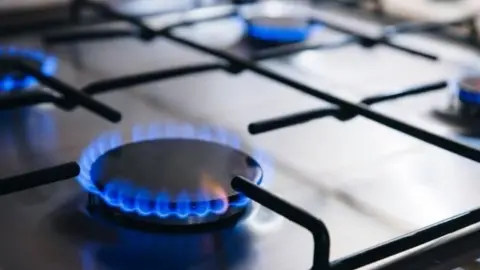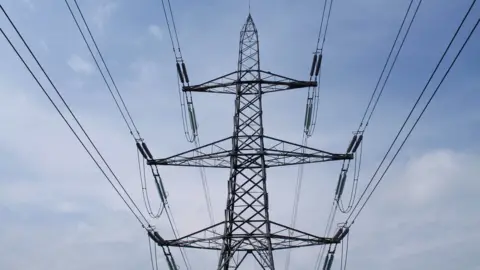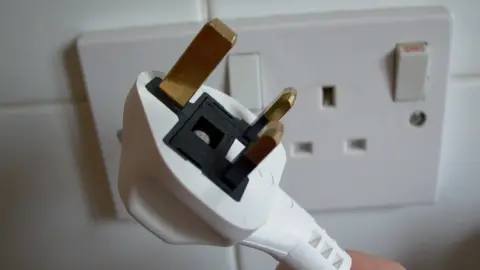Energy prices: Why are power bills going up?
 Getty Images
Getty ImagesHouseholds are facing a steep increase in their energy prices due to supply and demand on the global wholesale market.
This has driven up the amount providers pay for gas and electricity - and that cost is now being passed on to the consumer.
In the past 12 months, both of Northern Ireland's gas providers and all six electricity providers have increased their prices multiple times, adding hundreds of pounds to power bills.
Who is increasing energy prices? And by how much?
On 7 June, Firmus Energy announced a 24.5% hike to its gas prices for greater Belfast, to come in 1 July.
This will increase bills by about £300 a year, according to the Consumer Council, and affects about 49,000 customers.
It is the company's fifth rise since April 2021, and is on the heels of a Firmus Energy announced a 37% gas price hike for its Greater Belfast network which came into effect at the start of May.
That hike, announced in April, was said at the time to increase bills by about £330 a year.
So combined, the two latest increases will add about £660 to bills.
Also in June, SSE Airtricity announced a 42.7% increase in gas prices from 1 July.
The move will hit 186,000 customers in Northern Ireland.
They are the latest in a number of price increases for both networks.
In May, an increase of 16.31% for Firmus's Ten Towns network - which covers about 55,000 customers and includes Antrim, Armagh, Ballymena, Coleraine, Craigavon, Londonderry and Newry - came into effect.
Prices for the Ten Towns network were put up by more than a third in its Ten Towns network from February 2022.
The Utility Regulator said it would bring the average household gas bill in the Ten Towns area to £1,293 a year.
In April 2021, the average bill was £518.
- In November 2021, Firmus announced a 38% increase for the Ten Towns network from early December, on the heels of a 35% increase announced the month before.
- Then, in December 2021, the company Firmus announced a 19.5% hike in Greater Belfast, three months after it announced an increase of more than a third (this took effect from 22 October 2021).
- SSE Airtricity increased its natural gas prices for households and businesses by 39% from April 2022. It will add about £244 onto the typical household bill - the biggest rise in gas prices in their network since May 2011, according to the Consumer Council.
- The firm also increased its gas prices 21.8% in October 2021, adding about £112 to the average household bill, according to the company.
 Getty Images
Getty ImagesIn May and June, SSE, Budget Energy and Electric Ireland all raised their prices by about a third.
SSE increased electricity prices by 33% from 1 June, and Budget prices went up 27% on 27 May.
Electric Ireland's prices increased by a third from 1 May.
Power NI - which has 50% of the electricity market share in Northern Ireland - increased its price for domestic customers by 21.4% from 1 January 2022.
The rise means typical household electricity bills will go up by £131 a year.
The company had previously increased its prices by 6.9% in July 2021, adding about £41 a year to a typical household bill.
Their competitors have done the same.
- Click Energy prices increased by 16% from 1 October 2021, adding about £100 to household bills a year
- Bright Energy increased prices from June 2021 adding £42 to typical bills and £25 for keypad customers
Why are energy prices increasing?
Wholesale energy prices - what our providers pay for gas and electricity - have reached an all-time high.
Energy providers have begun to pass on those costs to consumers.
Why are global wholesale prices increasing?
Numerous factors have affected supply and demand, pushing up prices. Some analysts have called it a perfect storm.
Russia's invasion of Ukraine is the latest contributor to record energy costs.
Russia is the second-biggest exporter of crude oil, and the world's largest natural gas exporter, which is vital to heating homes, powering planes and filling cars with fuel.
The US, EU, and UK placed restrictions on oil and gas imports from Russia after it invaded Ukraine in February.
Costs were already high before that, due to a cold winter in Europe last year put pressure on supplies and, as a result, stored gas levels are much lower than normal.
Hot weather in Asia saw more gas used for air-conditioning, while gas exports from Russia to north-west Europe were lower, even before the Russia-Ukraine conflict.
Aren't these prices regulated?
Some prices in Northern Ireland are overseen by the Utility Regulator, in a process equivalent to the price cap in Great Britain.
The regulator is only responsible for Northern Ireland's largest electricity provider Power NI.
The other five suppliers are unregulated and can increase their prices whenever and by however much they want.
The gas market is slightly more complicated.
The Utility Regulator must approve any tariff changes proposed by Firmus Energy in its Ten Towns network but not in Greater Belfast.

SSE Airtricity must also go through the regulator for price increases in Greater Belfast.
The Utility Regulator has capped the amount of profit gas providers can make at about 2%.
Power NI's profit is capped at 2.2%.
Why can't the regulator stop the increases?
The Utility Regulator has no control over wholesale energy costs, said its chief executive John French.
Record wholesale energy costs is one of the key reasons for the price rises, Mr French told BBC News NI.
"As this element makes up around 50% of a consumer's electricity and gas bill it will have a big impact on the final price you pay," he said.
So although a company's profit is capped that doesn't stop prices going up as the cost of commodities increases.

The actual cost of the energy makes up about half of our bills and the rest goes to the companies who manage the pipes and to cover other expenses.
So if the price of energy goes up the amount companies have to charge to make that 2% profit also increases.
But that cap doesn't mean those companies aren't making a healthy return, according to Peter McClenaghan at the Consumer Council.
Will prices keep going up?
Basically, yes.
Utility Regulator chief executive John French said there were three years of high costs ahead, as wholesale prices - which dictate what we pay as consumers - were likely to remain at an "unparalleled high".
He added: "If wholesale prices begin to reduce, our system of regulation in Northern Ireland allows us to act to make sure that reductions are fully passed onto consumers as quickly as possible."
Mr French said government - both at Stormont and Westminster - regulators and providers should prepare to have to support customers with high energy costs through the next two winters.
What can I do?
Although prices are increasing across the board it is always worth shopping around.
Aodhan O'Donnell, who oversees a website which allows consumers to switch providers, said there is still potential to save.
"Prices are only going one way at a moment, they will continue to go up," he said.
"The incentive to switch is still there. In the electricity market there are six suppliers and over 30 tariffs. There is about a £165 difference between the most expensive and the most competitive tariffs.
"For gas customers there is limited choice and competition and some people cannot switch."
